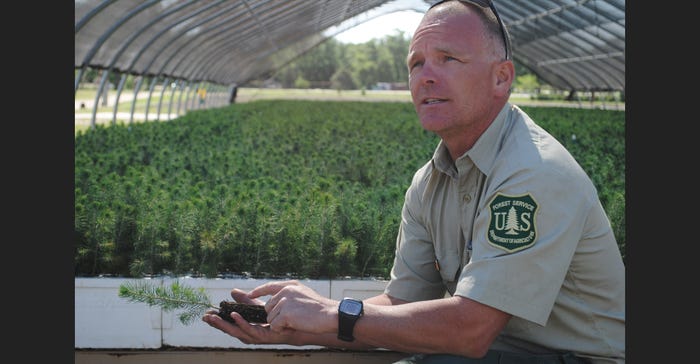
Renowned University of Nebraska botanist Charles E. Bessey knew all about conservation-minded President Teddy Roosevelt. In 1902, Bessey convinced Roosevelt that a hand-planted forest on the prairie in the Sandhills of Nebraska would provide a needed timber reserve for a growing industrial nation, and it would allow scientists to conduct experimental tree plantings.
Bessey thought that a man-made forest could potentially influence the local climate of the Sandhills in a positive way. The whole idea was environmental engineering on a grand scale, and Roosevelt loved it.
Roosevelt designated the Dismal River Forest Reserve on 200,000 acres of treeless Sandhills prairie. He allowed for the establishment of a new tree nursery, named for the famous UNL botanist, on 80 acres of flat floodplain along the Middle Loup River, about 2 miles west of present-day Halsey.
The sandy soils and plentiful water supply provided the perfect setting for growing tree seedlings that could be used to grow this giant man-made forest on the prairie.
By that fall, tree seed collection took place in the Pine Ridge of Nebraska and the Black Hills. The first seed was sown at the nursery site in November, and by the following spring, tens of thousands of new seedlings were planted, including jack pine, yellow pine, red cedar and blue spruce.
Charles A. Scott, the first Nebraska National Forest supervisor at the site, reported that early results were discouraging, but that didn’t deter the efforts. Over the years, with passage of the Kinkaid Act of 1904 and the Clarke-McNary Act of 1924 on through the New Deal conservation and windbreak development programs of the 1930s, the key role of Bessey Nursery increased as it provided trees for planting across the Plains states.
Largest man-made forest
Around the nursery, the largest man-made forest in the country was planted. This Halsey portion of the Nebraska National Forest is managed today by the Bessey Ranger District, and includes Bessey Nursery, the historic Scott Lookout Tower and a recreation area surrounding the forest ranger district headquarters.
Bessey Nursery manager Richard Gilbert understands the legacy he is carrying on at this historic place. “The nursery has been producing plants since 1902 to help protect our national resources, cropland, livestock, wildlife, and ranch and farm homes,” Gilbert said in a 2014 Nebraska Farmer interview. “It is an honor to carry on the tradition and vision of Charles E. Bessey.”
The nursery produces seedlings for the Nebraska Conservation Tree Program for distribution to rural landowners across the state, as well as in North Dakota, South Dakota, Wyoming, Colorado and Kansas.
Seedlings also are produced for the Bureau of Indian Affairs Reservations in South Dakota and Wyoming, along with providing seed bank storage and seedlings for reforestation efforts across Rocky Mountain Region 2.
Bessey Nursery, which is the oldest U.S. Forest Service nursery, is capable of producing 4.5 million bare-root conifer and hardwood seedlings each year on 46 irrigated acres of seedbeds. On average, the nursery produces about 1.5 million seedlings, along with hundreds of thousands of container tree seedlings under gigantic controlled greenhouses.
Bessey also extracts, cleans and stores seed obtained from cones and berries from the region. The facility stores about 14,000 pounds of tree seed to protect against national disasters, including wildfires and insect devastation.
Learn more about Bessey Tree Nursery by calling Gilbert at 308-533-2257.
About the Author(s)
You May Also Like






